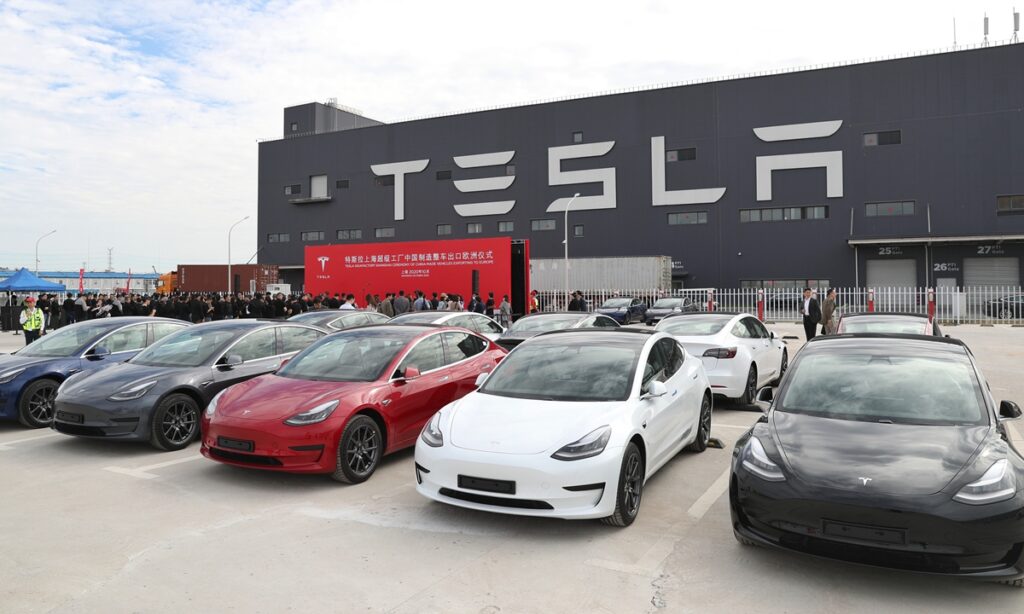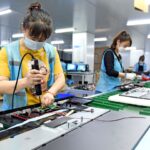The record sales achieved by US carmaker Tesla in the second quarter of this year not only reflect the importance of the fast-growing Chinese market for new-energy vehicles(NEVs), but also highlight the potential of China-US economic cooperation in spearheading new market opportunities.
Tesla surpassed market expectations in the second quarter of 2023, announcing on Sunday that it delivered over 466,140 vehicles, an 83 percent year-on-year increase and a new record. Its production in the April-June period reached 479,700 vehicles, up 86 percent from the previous year.
While some reports attributed Tesla’s stellar performance to its price cuts and US federal credits that helped make its electric vehicles more affordable over the past months, its robust production and sales data may also, in part, receive support from the rapid development of China’s NEV sector. For instance, in May, Tesla deliveries of Model Y vehicles in China surged 152 percent year-on-year, according to data from the China Passenger Car Association.
Indeed, Tesla is becoming one of the major beneficiaries of China’s fast-growing NEV market. Other beneficiaries may include some Chinese names like BYD, and Xpeng. Almost at the same time, BYD also posted its best-ever quarterly sales results of 700,244 NEVs in the second quarter, another proof of China’s strong market demand.
China has been the world’s largest producer and consumer of NEVs for eight consecutive years. Monday marked a significant milestone in the history of China’s automobile development as the country surpassed the production of 20 million NEVs. Whether considering the market or production capacity, there is no denying that China’s NEV sector is undergoing rapid development.
Of course, the achievements of China’s NEV sector today have seen the strong support from China’s government policies and continuous innovation of Chinese carmakers. However, Tesla has also played an important role in expanding the Chinese market for green transport, which can be seen as a typical example of China-US economic and trade cooperation. Tesla has led the development of China’s electric vehicle market by introducing mature business models, while the Chinese manufacturing and market demand have also contributed to Tesla’s position as the world’s largest electric vehicle manufacturer.
It needs to be acknowledged that competition in China’s electric vehicle market is becoming increasingly fierce, but it is through this fierce competition that electric vehicle technologies of various companies have seen further development and improvement. This technological progress has also promoted Chinese demand for NEVs, exploring new market opportunities.
If anything, what Tesla has accomplished in China has been evident enough to show the necessity of China-US economic cooperation returning to the right track.
Over the past years, although Tesla has achieved remarkable performance in the Chinese market, the Biden administration has been increasing its crackdown on China’s industrial chain through the “decoupling” push. But what politicians in Washington have been pressuring for toward China on the economic and trade front doesn’t necessarily represent the true thinking of American industries. In fact, even Tesla has faced political pressure for its operations in China. For instance, when Tesla in April revealed plans to open a Megapack battery factory in Shanghai, Mike Gallagher, the Republican chair of the House of Representatives’ select committee on China’s Communist Party, expressed concerns about Tesla’s dependency on China, according to Reuters. Business communities from both China and the US now share a common hope of returning to normal track of cooperation, where business decision-making can be free from political interference and distorted geopolitical influence.
As agreed between China and the US, US Treasury Secretary Janet Yellen will visit China from July 6 to 9, China’s Ministry of Finance said on Monday. It is hoped that the visit could be a silver lining in bringing about substantial improvement in bilateral relations, and that the US can truly acknowledge the potential of China-US cooperation and the importance of the irreplaceable Chinese market for US businesses.
(Global Times)




